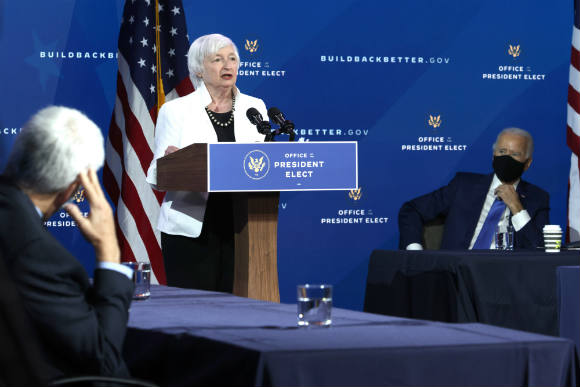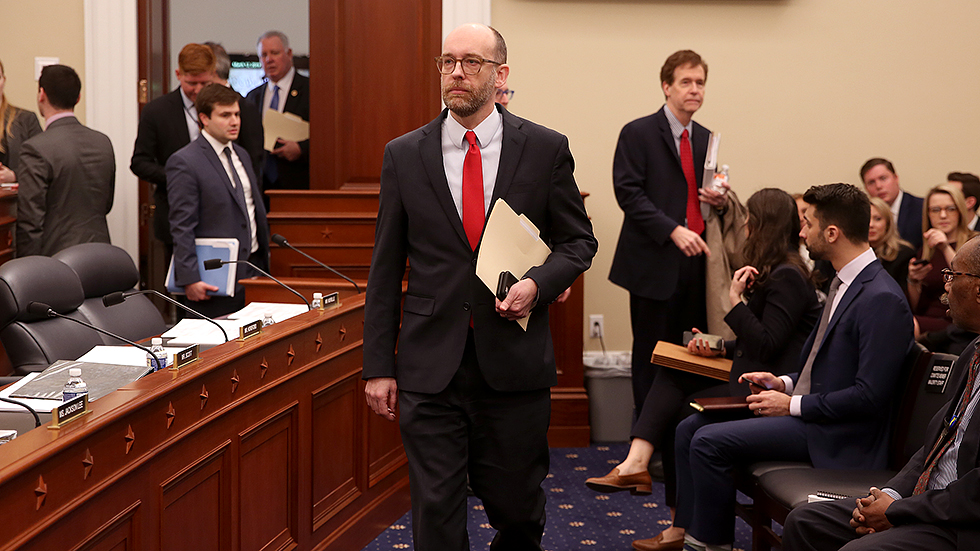On The Money — Yellen sounds alarm on national default

Happy Wednesday and welcome to On The Money, your nightly guide to everything affecting your bills, bank account and bottom line. Subscribe here: digital-release.thehill.com/newsletter-signup.
Today’s Big Deal: Growing urgency to raise the federal debt limit with no progress in Congress toward getting it done. We’ll also look at a major moment for the Democratic spending push and how much you’re paying for meat.
But first, a highlight reel of Derek Jeter jump-throws.
For The Hill, I’m Sylvan Lane. Write me at slane@digital-release.thehill.com or @SylvanLane. You can reach my colleagues on the Finance team Naomi Jagoda at njagoda@digital-release.thehill.com or @NJagoda and Aris Folley at afolley@digital-release.thehill.com or @ArisFolley.
Let’s get to it.
 Treasury Secretary Janet Yellen is setting off alarm bells over a looming brawl over the nation’s borrowing limit that could spark a global economic crisis if Congress fails to take action.
Treasury Secretary Janet Yellen is setting off alarm bells over a looming brawl over the nation’s borrowing limit that could spark a global economic crisis if Congress fails to take action.
Yellen’s warning, delivered to congressional leaders on Wednesday that the country could default on its debt as soon as next month, is casting new urgency on the behind-the-scenes discussions about how to raise the debt ceiling. But no clear end game is in sight.
- Democrats could need 10 GOP votes to raise the debt ceiling if Republicans filibuster the measure. Democrats have only 50 votes in the Senate, and GOP leaders have indicated they will not help raise the borrowing limit.
- Including a debt ceiling hike in the budget reconciliation measure that Democrats are now drafting would be one way around the GOP, but Democratic leaders have signaled they don’t want the debt ceiling to be a part of that package.
- Another option for passing the debt ceiling would be to include it in a short-term government funding bill Congress needs to pass by the end of the month to avert a government shutdown, but that could backfire if Republicans bail.
“The time for Congress to act is now to make sure the U.S. does not come close to defaulting on some of its obligations,” said Rachel Snyderman, associate director at the Bipartisan Policy Center, a non-partisan think tank that closely tracks the debt limit. “But what’s concerning right now is that there are so many important priorities at play,” she continued. The Hill’s Jordain Carney and I have more here.
LEADING THE DAY
The House Ways and Means Committee on Thursday will begin marking up parts of President Biden’s $3.5 trillion budget plan, as the party continues its race against the clock to craft its massive social safety net package this month.
The committee has unveiled several legislative proposals it plans to take up as it commences its multi-day markup later this week, including universal paid family and medical leave, as well as expanding Medicare coverage to include dental, hearing and vision benefits.
- The markup will kick off a complicated process for Democrats as they struggle to maintain a united front amid spending negotiations for the coming package, which the party hopes to pass using a process called reconciliation that allows them to bypass the Senate filibuster.
- The committee’s portion of the package is expected to make up a significant chunk of the overall bill and will likely add fuel to already existing tensions between the different factions of the Democratic party over spending.
The Hill’s Aris Folley tells us what to expect here.
White House raises concerns about meat prices

Biden administration officials on Wednesday raised concerns about increased prices of meat at the grocery store and outlined steps officials are taking to ease the burden on families and farmers.
Appearing at a White House briefing, National Economic Council Director Brian Deese said that increasing prices for poultry, beef and pork are driving half of the food price increases consumers are experiencing at grocery stores.
- Deese noted that four companies control the majority of meat supply chains, with those companies seeing record or near record profits during the coronavirus pandemic. Those companies are JBS, Tyson Foods, Cargill Meat Solutions Corp. and National Beef Packing Co.
- To address the price increases, the Department of Agriculture plans to invest $1.4 billion in pandemic assistance to get relief to small producers, processors and distributors, officials outlined in a blog post.
- The USDA and Justice Department are also conducting a joint investigation into price-fixing in the chicken-processing industry.
The background: Biden is facing growing political pressure over the steady rise in inflation that began shortly after he took office, largely due to the reopening of the economy. But the meat industry has been a constant focus of antitrust officials in both his and former President Trump’s administration, drawing concerns from both sides. The Hill’s Morgan Chalfant has more here.
FOREVER A LOAN
GOP lawmakers urge Cardona against executive student loan wipeout
Four House Republicans are pressuring Education Secretary Miguel Cardona to rule out a potential mass forgiveness of federal student loan debt without congressional approval.
In a Wednesday letter to Cardona, GOP Reps. Ted Budd (N.C.), Warren Davidson (Ohio), Scott Petty (Pa.) and Barry Loudermilk (Ga.), asked the education secretary for a “commitment that you will not seek to usurp the will of the people and the authority Congress has delegated in cancelling student debt beyond what the law clearly allows.”
“Mass cancellation of student loan debt would not only be a clear violation of the separation of powers but would also be an affront to the millions of borrowers who responsibly repaid their loan balances,” they wrote.
While Biden and Cardona have wiped out roughly $9 billion of the approximately $1.6 trillion federal student loan balance sheet through preexisting forgiveness programs, the president is waiting for the results of a legal review to take action on broad-based forgiveness. I explain here.
Good to Know

The budget chief for former President Trump is refusing to step down from the Naval Academy’s Board of Visitors after he was asked to resign on Wednesday, along with a number of other Trump appointees.
Here’s what else have our eye on:
- The U.S. loses roughly $163 billion each year in taxes owed and unpaid by the richest Americans, the Treasury Department estimated in a Wednesday blog post defending President Biden’s tax plan.
- Job openings hit another record high in July before the delta variant upended the U.S. labor market, according to data released Wednesday by the Labor Department.
- Senate Budget Committee Chairman Bernie Sanders (I-Vt.) said on Wednesday that President Biden’s sweeping spending bill should be at least $3.5 trillion, putting him on a collision course with key moderates who think the figure is too high.
- The chief executive of Coinbase claimed in a series of tweets Tuesday that the Securities and Exchange Commission (SEC) is investigating his company over an upcoming cryptocurrency lending program.
Nearly one-fifth of U.S. workers said their employer is requiring staff to get vaccinated against COVID-19 as of last month, according to a Gallup survey released Wednesday.
That’s it for today. Thanks for reading and check out The Hill’s Finance page for the latest news and coverage. We’ll see you tomorrow.
{mosads}
Copyright 2023 Nexstar Media Inc. All rights reserved. This material may not be published, broadcast, rewritten, or redistributed.

